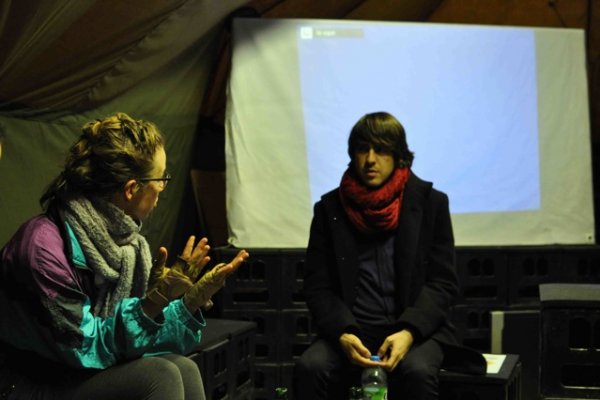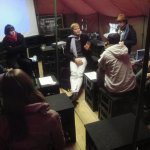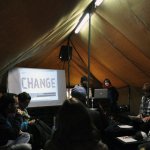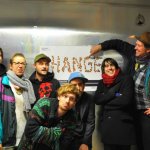Gabriel started us off by screening his short film ‘THE FUTURE OF MONEY’. the film highlighted how great creative ideas, often innovative or radical, are left dormant in the minds of individuals who don’t have the means to get their project going. the idea behind ‘THE FUTURE OF MONEY’ is that mass collaboration is changing notions of ownership and redefining aesthetics of art. creatives will find themselves with unimaginable opportunities, leading to stronger innovation, competition and productivity. with the lovely Konrad, we happily discussed what this would all mean for the future of money and the influence of alternative currencies.
but the atmosphere changed when Georg joined the panel of discussion. Gabriel and Georg shook hands, meeting for the first time offline after collaborating together strictly online for the past year. and Georg brought the air a dignified professor, presenting such a sophisticated aura of knowledge and authority, yet allowing people to speak freely.
he talked us about his book, ‘CLASH OF CURRENCIES’ and the emergence of a new world currency. he also elaborated on how the current paper money system (developed behind closed doors by a few powerful interest groups) is designed to finance wars, linking the housing bubble and various economic crashes with the ability to carry out conflict. the current system – key currency with fixed exchange rates – is implemented with the intention to disadvantage poorer countries. Georg proposed a smaller, more decentralized monetary system where competition and societal pressures can keep larger, more powerful nations from exerting fiscal control over smaller nations.
and then the conversation turned to living in a world without money. we started to dive deeper and had to confront our own ideas about money and value as well as the possibility of a moneyless society (if possible) and alternative currencies.
as it got darker and colder, each of us weighed up our belief in the value of goods and objects over the value of cash. can two different goods/services, such as loaves of bread and giving piano lessons, really ever be equal in value regardless of whether both parties agree to the exchange as being fair? or will the value of a €10 note always remain a fair values because you have the ability to buy exactly what you need?
it seemed that no two opinions in the room were the same (though everyone was incredibly respectful of each other). we were passionately divided as to whether an exchange of goods has a monetary element in itself, or if the exchange of goods creates a value that is only applied to the specific situation and couldn’t be attached to a monetary value.
we circled around the debate until well after the food was ready, concluding that value is a highly personal and subjective matter.
we then piled out of the tent and continued to converse about alternative currencies until the sun went down.
also read the critical review on FAKTOID by Carsten Hucho #108










